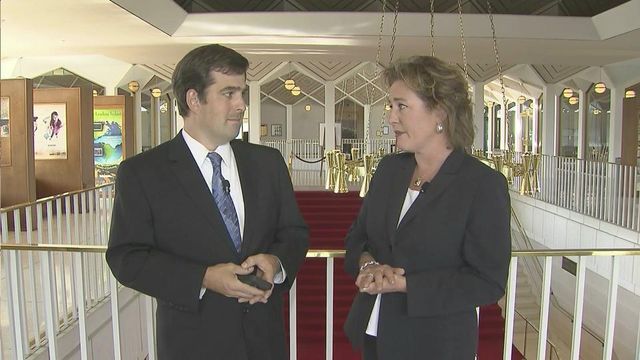Lawmakers close deal on coal ash
Senior lawmakers say they may be able to reach a deal on legislation to instruct Duke Energy on how to clean up its coal ash ponds by the end of this week. Word of the deal revives a discussion that could have been delayed until 2015.
Posted — Updated"I am told that the House and the Senate may have reached consensus on the coal ash bill," House Speaker Thom Tillis told his chamber early Tuesday afternoon. He did not further elaborate, other than to warn House members they may be asked to review a bill Tuesday and vote on it Wednesday or Thursday.
Early in the afternoon, neither side was ready to commit to the tentative deal.
"Nothing is signed yet," cautioned Sen. Tom Apodaca, R-Henderson. "We feel like we're getting very close, but we've been here before."
Meanwhile, Rep. Chuck McGrady, R-Henderson, one of the House's lead negotiators on the coal ash measure, said he is ready to sign a deal if Senators hold to a bargain struck during the past two days.
But by 7 p.m., Senate leaders were heralded the measure.
“As a resident of the community most severely impacted by the recent Dan River coal ash spill, I am personally grateful to Sen. Tom Apodaca, who has spent hundreds of hours working on this bill, along with all House and Senate conferees for persevering to get this done," Senate President Pro Tempore Phil Berger said Tuesday evening.
Some environment advocates said on background Tuesday evening that they were encouraged by the bill's progress, which for the first time lays down standards for handling toxic coal ash at least as carefully as household garbage.
But other groups blasted the deal as a sop to Duke Energy.
"This bill asks all of us to trust DENR and a group of political appointees to make the coal ash decisions for all of North Carolina, when DENR and our politicians have repeatedly failed to clean up coal ash pollution and DENR’s coal ash activities are under investigation by a federal criminal grand jury," said Frank Holleman, a lawyer with the Southern Environmental Law Center.
Environmental advocates have pushed the company to dig up the ponds and move the ash, material left over after coal is burned for fuel, to lined landfills.
Both the House and Senate have crafted bills that address the coal ash issue, although both leave open the possibility that ash would be left in its existing ponds and "capped" in place. The bills share many features in common, although the bill passed by the Senate laid down stricter timelines for dealing with the ash. However, it was a last-minute provision pushed by House negotiators that would impose a more stringent requirement that caused the latest blow up in negotiations.
The House and Senate bills would divide the 33 coal ash ponds into low-, medium- and high-risk ponds, but neither piece of legislation defines what "low risk" means. High-risk ponds would have to be cleaned up right away, while Duke would have greater flexibility in cleaning up medium- and low-risk ponds.
House negotiators wanted to insert a provision into the final bill that said no pond could be low risk if it was close to surface waters such as streams and lakes. Senators objected to the provision, saying they didn't know what the consequence would be.
That language was the last remaining sticking point, said Apodaca and McGrady.
"We have an engineering definition of that and an legal definition of what that would mean. We're trying to reconcile those two," Apodaca said earlier Tuesday.
McGrady, one of the House's lead negotiators on coal ash, said that while House and Senate negotiators have traded various proposals over the past two weeks, as recently as Sunday he would not have signed language offered by the Senate. A flurry of negotiations Monday and Tuesday turned things around, he said.
The bill will say that no coal ash pond in which the coal ash is sitting in ground water could be considered "low priority." This will eliminate many of the ponds from the low priority category, he said.
"I think we're there," McGrady said, adding that he has verbally agreed to sign a conference report that would allow the House and Senate to vote on the final deal.
Both the Senate and House tentatively plan to vote on the deal Wednesday.
• Credits
Copyright 2024 by Capitol Broadcasting Company. All rights reserved. This material may not be published, broadcast, rewritten or redistributed.






